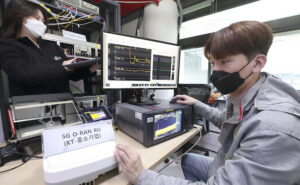Cambridge Wireless argued the full potential of 5G will only be unlocked by industrial use cases as it revealed the results of various private network trials spanning autonomous vehicles, healthcare, smart manufacturing and robotics.
During an event at the Cambridge Science Park, CTO of special projects David Roberts (pictured) asserted the full transformative potential of 5G lies in industrial IoT and enterprise sectors rather than the consumer use cases currently generating headlines.
Discussing the latest round of trials on Cambridge Wireless’ standalone private 5G network, Roberts explained “we spend a lot of time looking at the business side of things” in addition to the technology itself.
The trials by UK-based start-ups were conducted under a 5G accelerator programme Cambridge Wireless established in conjunction with Huawei.
Roberts noted the programme is designed to determine the “proof of value of 5G”.
Mobile operators are not currently involved beyond providing access to licensed spectrum, though this does not preclude future arrangements, Roberts said.
Adding to the business-focused side of the accelerator programme, Roberts noted Huawei provided mentorship to each company involved.
Trials
The accelerator operates over a 12-week period, with the latest round the third out of a planned six.
Engineering company Renishaw researched Industry 4.0 applications with a focus on high-precision machinery and how 5G could deliver smart factory capabilities including machine control with latency of less than 2 milliseconds and reconfiguring sites to match changing production processes.
Conigital tapped the high bandwidth of 5G to advance its Level-4 autonomy self-driving vehicle platform, citing potential in areas including AI and machine learning to optimise its range.
PHINXT Robotics explored automation and connectivity, including providing live HD video streams to enable remote operation of robots and ensuring machines from different manufacturers work together.
And i3 Simulations detailed tests of remote healthcare training employing VR, providing realistic environments in which students can learn, in turn lowering the risks and costs involved while also extending the range of subjects which can be covered.
Applications for the next round of tests are now being accepted, though Roberts warned “the barrier for entry is quite high”, as Cambridge Wireless seeks out companies “where 5G is a real game changer” and which have designed products specifically for the technology rather than upgrading 3G and 4G systems.
Subscribe to our daily newsletter
Back
Source of Article



